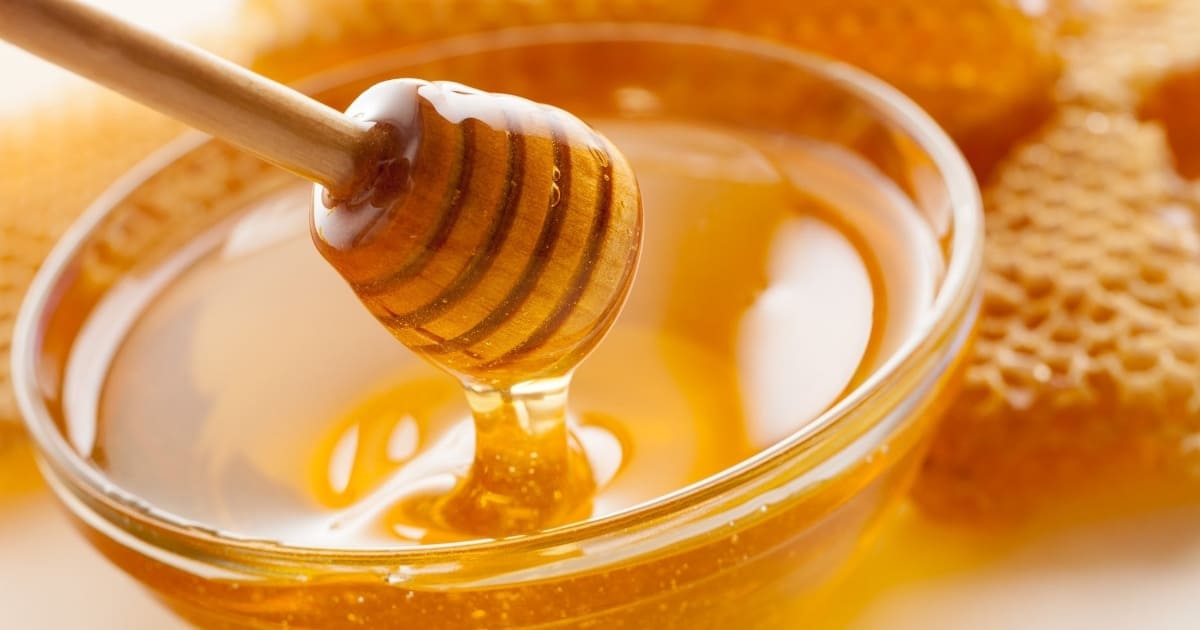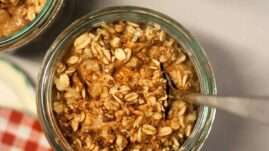Humans have been eating and using honey as medicine for thousands of years. The first record of organized beekeeping, and honey, dates back to ancient Egypt in the year 5,500 BCE, making it man’s first and most reliable sweetener.
Today, honey is consumed all over the world and is touted for its natural taste, health benefits, and sweetness. But is honey good for people with diabetes?
This article will explain the health benefits of eating honey, the pros and cons of eating honey, and how (and if) you should incorporate honey into your diet.

What is honey?
Honey is a thick, golden liquid that is produced by bees from the nectar they collect from flowering plants.
Since honey cannot exist without bees producing it from the nectar they collect from flowers, many people who eat a plant-based diet do not consider this food vegan.
Unlike cane sugar, which tastes the same everywhere, honey is extremely versatile and can taste vastly different depending on the region and local flora from where it is collected. There are over 300 different varieties of honey in the United States alone.
1 standard tablespoon of honey (21 grams) contains 64 calories and 17 grams of sugar, with virtually no protein, fiber, or fat.
How honey affects blood sugar
Honey is a natural form of sugar, and like all sugar, its natural job is to raise blood glucose levels.
Honey has a lower glycemic index (GI) than sugar but the difference is very small (58 for honey vs. 60 for sugar). The glycemic index measures how quickly a carbohydrate raises blood sugar levels.
That means that if you live with diabetes and eat honey, you are at risk for high blood sugar, so make sure you’re measuring, counting carbohydrates, and dosing insulin (or other diabetes medications) appropriately.
While it may cause higher blood sugar, honey can be used as an excellent low blood sugar snack (just don’t overdo it!).
Is honey different from other sweeteners?
Honey is a supersaturated sugar solution with approximately 17.1 percent water. Fructose is the predominant sugar at 38.5 percent, followed by glucose at 31 percent.
The main difference between honey and sugar is that honey also contains vitamins and minerals like potassium, calcium, zinc, and vitamin C, and antioxidants.
So while honey affects blood sugar just as much as regular sugar does, it has a slightly better overall health profile.
If you are looking for a sweetener that doesn’t affect your blood sugar or affects it minimally, you can choose from this list of the best sweeteners for people with diabetes.
Health benefits of honey
There are a surprisingly large number of health benefits one can get from regularly consuming honey.
It has bioactive plant compounds and antioxidants
Compared to table sugar, which is nutritionally devoid of benefits, honey contains plenty of natural bioactive plant compounds and antioxidants, such as flavonoids, with the darker-colored honey varieties containing the highest amounts.
Studies have shown that buckwheat honey actually increases the antioxidant value of human blood!
Antioxidant-rich diets have been linked with lower risk of heart attacks, stroke, and cancers, and have shown to even improve eye health.
Honey also contains B vitamins, amino acids, antibiotic-rich inhibin, and proteins. The following vitamins and minerals are found in honey in trace amounts:
- Niacin
- Pantothenic Acid
- Calcium
- Magnesium
- Riboflavin
- Manganese
- Potassium
- Zinc
- Phosphorous
The most abundant sugar in honey is fructose, which has more energy and is sweeter than artificial ingredients, making it an excellent low snack to treat hypoglycemia.
It may help with allergies
The research on this is mixed, but it is believed that if someone is struggling with seasonal allergies from the grasses and flowering plants in their area, ingesting local honey can help their systems adjust to the local flora and pollen and alleviate allergy symptoms.
One study found that when honey is eaten in large doses, it can help alleviate seasonal allergies after about 8 weeks.
However, a different study comparing pasteurized honey with local honey compared the effects on allergies in a population and found no significant difference.
If you’re struggling with seasonal allergies and have a taste for honey, it can’t hurt to try this remedy!
Promotes wound and burn healing
The topical use of honey has been a common medicinal practice since ancient Egypt. One meta-analysis found that honey is extremely effective at healing partial-thickness burns and infected wounds after surgery.
Honey is also an effective topical treatment for diabetic foot ulcers. Another study found that the topical treatment of honey on diabetic foot ulcers was a curative treatment in 97% of patients!
Honey can also treat everything from common skin rashes to psoriasis and even herpes. This is due to honey’s natural antibacterial and anti-inflammatory properties.
Effective cough suppressant
The soothing properties of honey when one is sick are scientifically proven! When compared to two over-the-counter cough medicines, honey was found to be more effective at helping to soothe cough and sore throats.
In the study, honey was especially helpful in alleviating cough frequency, cough severity, and improving the sleep quality of children and parents with sore throats and cough.
Another study corroborated their findings. Beware that honey should never be given to children under 1 year old, however, due to the risk of botulism.
Lowers triglycerides
Multiple studies have shown that honey intake lowers triglyceride levels. High triglyceride levels have been associated with insulin resistance, type 2 diabetes, and increased risk for heart disease.
When used in place of sugar, honey consumption has been associated with lower triglyceride levels.
Another study found that participants who ate honey in place of sugar were able to drop their triglyceride levels by up to 19%!
The downsides of eating honey
While honey may seem like a healthy food, there are some definite downsides to regularly consuming it as well.
Weight gain
Honey is not a low-calorie food, nor does it have any satiating fiber, fat, or protein.
Honey is also usually eaten along with other foods (oatmeal, fruit, toast, etc.), so adding a lot of honey to your daily diet can quickly put you in a calorie surplus and more susceptible to weight gain.
A single tablespoon of honey has 64 calories, so make sure you’re limiting your intake if you’re watching your weight.
May cause infant botulism
Honey can contain bacteria that may cause botulism in infants under 1 year old. This is why it is not recommended for very young children under 12 months old.
If botulism spores are found in honey and swallowed, the spores release a toxin that infants’ immune systems are too immature to properly fight off, which can make them very ill.
To find out additional information on the prevention and treatment of infant botulism, read more here.
Cavities
Like all things sweet, eating too much honey can lead to cavities and gum disease, especially if ingested right before bedtime without brushing your teeth afterward.
Be wary of treating middle-of-the-night low blood sugars with honey, and talk with your dentist about the proper ways to take care of your teeth and gums if you enjoy eating honey but want to prevent cavities.
If you struggle with cavities, you may opt for a sugar-free sweetener instead of honey to add to your tea, coffee, or daily routine.
Easy to overdo it
Because honey has no fiber, fat, or protein, and it’s extremely sweet and good tasting, it can be easy to overdo it, so you need to be careful with proper portion sizes.
One serving of honey is a single tablespoon, but it can be easy to eat 3 or 4 times that much in a single sitting!
While honey has many healthy properties, eating too much can lead to issues, so be careful to eat it in moderation, and limit yourself if you’ve become hooked.
Make sure you’re also only ever eating pure honey, as many off-brands can add table sugars and cheap syrups creating a honey “blend” without the health benefits.






Colin Smith
I wish you had talked about Raw honey, it’s difference, and benefits? I always thought you could have a tiny bit of honey? I don’t think I could actually eat that much honey in a sitting, was it one teaspoon? That seems a lot to me!
Mr Michael J Bolger
Honey sounds great but not to over do it, beehive yourself!
Jj
I agree with you that honey is a great low treatment! I find one tablespoon to be much faster than 4 ounces juice. It’s as quick for me as the glucose gels I buy.
mikey
Assuming you have type 2 diabetes or are at a high danger for it, you may have heard cases that honey might be preferable for you over different sugars. Yet, while honey might have some medical advantages, it’s as yet a wellspring of basic sugar and starches. What’s more assuming that you have diabetes, you really want to count your starches over the course of the day, particularly assuming you’re utilizing drug like insulin. This is what you really want to know before you conclude how you should deal with honey in your eating routine.